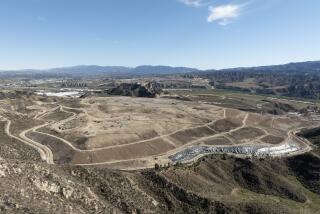Ventura Agrees to Divert Trash to Help Struggling Local Landfill : Waste: It would be cheaper to keep dumping its garbage at L.A. County landfills. But council members say assisting Bailard will serve the city in long run.
The Ventura City Council on Monday decided to send the city’s garbage to Bailard Landfill, guaranteeing the financially strapped facility a steady income.
Increased recycling, the recent drought and competitive prices from rival landfills have caused the amount of trash sent to the county’s largest and oldest operating landfill to drop in recent years, officials said. The drought brought a decrease in “green waste,” yard clippings and waste.
Ventura has been sending about 70 tons of trash a day to landfills in Simi Valley and Chiquito Canyon in Los Angeles County, said Councilman Gary Tuttle, who heads the city’s waste committee.
The dumping fees at those landfills are lower than at Bailard, which has one of the most expensive fees in the state. Bailard will receive about $700,000 to $800,000 annually from Ventura’s trash, Tuttle said.
The Ventura Regional Sanitation District, which operates the Bailard Landfill, reduced dumping fees from $44.50 to $39.50 per ton. Not including transportation costs, Simi Valley charges $24.40 per ton, and Chiquito Canyon charges $30 per ton, a Ventura city report said.
Bailard’s fees are unusually high because it includes costs for its planned closing. The 32-year-old landfill is scheduled to shut down this December.
For years, Ventura had been sending its trash to Bailard, but about seven months ago the city’s hauler, E.J. Harrison & Sons Inc., decided to go to Simi Valley and Chiquito Canyon because of the cheaper rates, Tuttle said.
Nan Drake, spokeswoman for E.J. Harrison & Sons, said the extra cost will have to be subsidized by the city or passed on to rate payers.
The council decided on a 5-1 vote to go to a more expensive landfill because Ventura--along with other west county cities--has agreed to pay for closing Bailard. By sending the city’s trash to other landfills, Ventura is depriving Bailard of money needed to close the landfill, Tuttle said.
“It’s kind of like buying local, but it’s spending local,” Tuttle said. Officials at the sanitation district hailed the council’s decision.
“There’s a lot of money going out the door,” said Assistant General Manager Jocelyn Komers. “Those closing costs would be borne by the citizens anyway. Why pay for it twice?”
City and county officials are under pressure to comply with Assembly Bill 939, which dictates that all California cities and counties slash their landfill use by 25% by 1995.
However, federal regulators Monday said they will try to give cities and counties more time to bring garbage landfills into compliance with new pollution standards. The Environmental Protection Agency will propose a six-month extension.
The Bailard landfill on unincorporated land along Victoria Avenue between Oxnard and Ventura may get a three-year reprieve. Ventura and other west county cities are seeking an extension because there are few alternate landfills.
If county and state authorities grant the extension, fees would be cut because closure costs would be spread out over a longer period, Komers said.
As a condition for sending Ventura’s trash to Bailard, Tuttle is asking that other west county cities send more recyclables to Gold Coast Recycling Co., which is partly owned by Jim Harrison. Harrison is one of three brothers who run E.J. Harrison.
Of the west county cities, Ventura sends by far the greatest amount of recyclable material to Gold Coast--about 65 tons a day, Drake said. As a result, Ventura is paying disproportionately more for recycling compared to the other cities, she said.
If Ventura can persuade other cities--especially Oxnard, which sends only 30 tons a day--to recycle more, then everyone’s cost will go down, Drake said.
Tuttle said he will use Ventura’s trash as leverage to get more cities to recycle.
But if recycling increases, then Bailard will have a harder time getting the money it needs to close because less garbage will be dumped. “Recycling is a good thing because it’s environmentally right,” Tuttle said. “But economically, it’s tough.”
More to Read
Sign up for Essential California
The most important California stories and recommendations in your inbox every morning.
You may occasionally receive promotional content from the Los Angeles Times.










